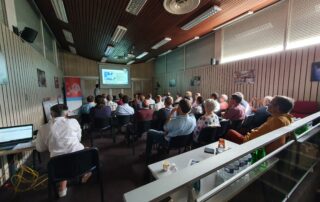COLLABORATION WITH ANOTHER EUROPEAN RESEARCH INSTITUTION
Neutron diffraction in pulsed field using the CEA-CRG spectrometer IN22 at the Institut Laue-Langevin (ILL), Grenoble. In recent years, the use of high magnetic fields in conjunction with beamlines has become increasingly important. For that, a mobile pulsed-field installation, developed at LNCMI Toulouse, is available to users at the ILL neutron source. Within the framework of the ISABEL project, EMFL and ILL reinforced their collaboration and defined the access procedure using this equipment. Researchers will submit their proposal at the ILL User Portal (https://www.ill.eu/users) and choose the IN22 sample environment. The equipment can only be used with support from [...]
EMFL PRIZE 2022 GOES TO MATEUSZ DYKSIK
After two years of rather impersonal prize ceremonies the EMFL Board of Directors was happy to hand over the EMFL prize 2022 in person to Dr. Mateusz Dyksik, who currently holds an assistant professor position at the Wrocław University of Science and Technology in Poland. The prize ceremony took place during the EMFL User Meeting in Grenoble. Mateusz Dyksik received the award for his cutting-edge research performed at the EMFL facilities. He used optical spectroscopy to understand the fundamental electronic properties of organic-inorganic perovskites thin films and nanocrystals which have important applications in light harvesting and photovoltaics. Mateusz employed [...]
USER MEETING 2022 IN GRENOBLE IN HYBRID FORMAT
Photo © Alexandra Gasparini After the online user meeting last year, it was a pleasure to see quite a number of users and staff in reality during this year‘s meeting. The 2022 edition of the EMFL user meeting took place in Grenoble at the LNCMI on June 15 in hybrid format. With up to 90 participants, 35 on site and 55 remotely connected, this year‘s meeting was once again well attended. The in-person discussions during coffee and lunch breaks were particularly productive in exchanging ideas and experiences between users and EMFL staff. Another aim of the meeting was to [...]




